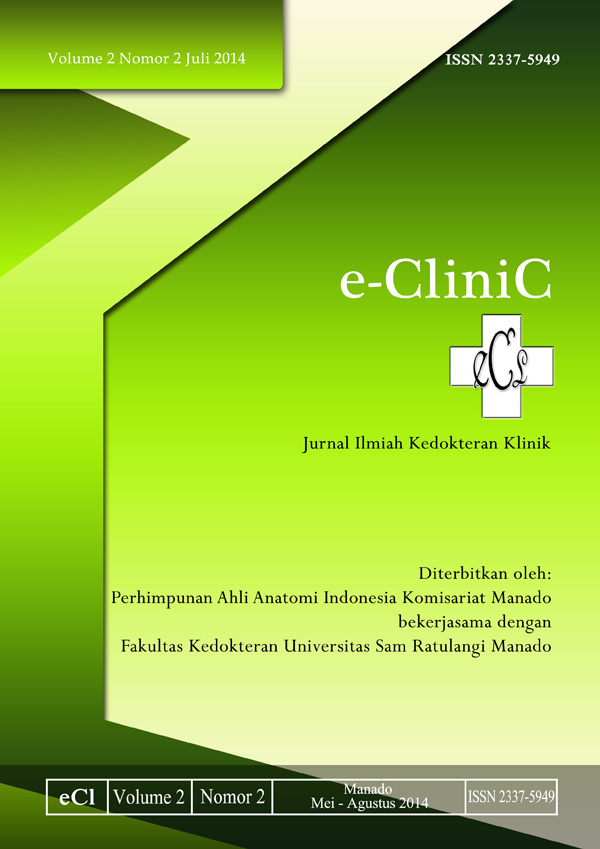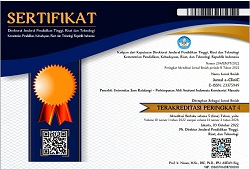PROFIL SUPPLEMENTARY SCALES MINNESOTA MULTIPHASIC PERSONALITY INVENTORY-2 (MMPI-2) ADAPTASI INDONESIA PADA MAHASISWA SEMESTER 1 TAHUN AKADEMIK 2013/2014 FAKULTAS KEDOKTERAN UNIVERSITAS SAM RATULANGI MANADO
DOI:
https://doi.org/10.35790/ecl.v2i2.5098Abstract
Abstract: College student as social beings confronted with a lot of exterbal or internal demandings. All the demands can be problematic, either it’s academic nor non academic. It requires subtantial adjusments in the life of someone who is not accustomed to the status of a college student. This research aim to was to conduct a mental status examination to college student as early detection of mental disorders. This research is a cross-sectional survey study to determine the mental status of the first semester students of Medical Faculty of Sam Ratulangi University school year 2013/2014 based on supplementary scales. Instruments used were the Indonesian adaptation of MMPI-2. Sample distribution obtained from 101 respondents by socio-demographic majority in female (72,22%), age 18 (85,71%), origin from North Sulawesi (51,58%), most tribe originating from North Sulawesi (51,8%), parents working as private sector workers (45,24%). Supplementary scales MMPI-2 distribution, scales obtained with a high precentage of succesion to the low: Mt (25,74%), A (21,78%), PK (20,19%), Ho (11,88%), AAS (9,9%), MDS (7,92%), Do (5,94%), MAC-R (5,94%), R (1,98%), Re (0,99%), dan OH (0,99%). Conclusion: From the results above the scales that found high are College Maladjustment Scales, Anxiety Scales, Post-Traumatic Stress Disorder Scales, and Hostility Scales. Scales for students who demonstrate a high yield should receive attention from faculty leaders to prevent the onset of mental disorders.
Keyword: Profile, supplementary scaless, MMPI-2, college student.
Â
Â
Abstrak: Mahasiswa sebagai makhluk sosial hampir selalu diperhadapkan dengan banyak tuntutan eksternal atau internal. Banyaknya tuntutan dapat menimbulkan masalah akademis maupun non-akademis. Dibutuhkan penyesuaian yang besar dalam kehidupan seseorang yang belum terbiasa dalam menyandang status mahasiswa. Tujuan dari penelitian ini untuk melakukan pemeriksaan status mental pada mahasiswa sebagai deteksi dini adanya gangguan mental. Penelitian ini merupakan penelitian survey potong lintang untuk mengetahui status mental mahasiwa semester 1 TA 2013/2014 FK UNSRAT berdasarkan supplementary scales. Instrumen yang digunakan adalah MMPI-2 adaptasi Indonesia. Didapatkan distribusi mahasiswa dari 101 responden berdasarkan sosio-demografik terbanyak pada perempuan (72,22%), umur 18 tahun (85,71%), asal daerah berasal dari Sulawesi Utara (51,58%), suku terbanyak berasal dari luar sulawei utara (51,8%), pekerjaan orang tua sebagai pekerja swasta (45,24%). Distribusi supplementary scales MMPI-2, didapatkan skala yang tinggi dengan presentase berturut-turut dari tinggi ke rendah yaitu: Mt (25,74%), A (21,78%), PK (20,19%), Ho (11,88%), AAS (9,9%), MDS (7,92%), Do (5,94%), MAC-R (5,94%), R (1,98%), Re (0,99%), dan OH (0,99%). Simpulan: Dari hasil di atas ditemukan skala yang tinggi yaitu College Maladjustment Scales, Anxiety Scales, Post-Traumatic Stress Dissorder Scales, dan Hostility Scales. Bagi mahasiswa yang skalanya menunjukkan hasil yang tinggi seharusnya mendapat perhatian dari pimpinan fakultas untuk mencegah timbulnya gangguan jiwa.
Kata Kunci: Profil, supplementary scales, MMPI-2, mahasiswa.
Downloads
How to Cite
Issue
Section
License
COPYRIGHT
Authors who publish with this journal agree to the following terms:
Authors hold their copyright and grant this journal the privilege of first publication, with the work simultaneously licensed under a Creative Commons Attribution License that permits others to impart the work with an acknowledgment of the work's origin and initial publication by this journal.
Authors can enter into separate or additional contractual arrangements for the non-exclusive distribution of the journal's published version of the work (for example, post it to an institutional repository or publish it in a book), with an acknowledgment of its underlying publication in this journal.
Authors are permitted and encouraged to post their work online (for example, in institutional repositories or on their website) as it can lead to productive exchanges, as well as earlier and greater citation of the published work (See The Effect of Open Access).







